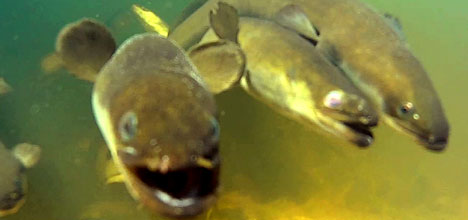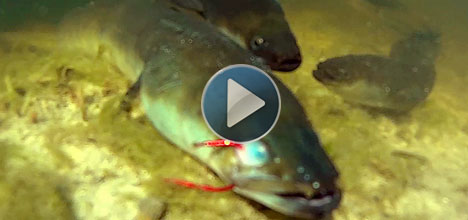Evidence someone's been fishing for eels in Bethlehem's Gordon Carmichael Reserve is being carried round by one of the reserve's eels – a large, shiny red fishhook sticking out of one eye.
The eels are gathering in the reserve because people are feeding them. The ‘no fishing' signs don't protect the eels.
The eel found with a large, shiny red fishhook sticking out of its eye.
They can be legally taken. There were ‘no fishing' signs put up while the city council was experimenting with grass carp to keep the aquatic weed under control, says Tauranga City Council communications advisor Catherine Connell.
The carp didn't do so well in the Gordon Carmichael Reserve, and have since found new homes at Papamoa. The signs were taken down this week.
Council permission is required to fish the eels commercially, but there's nothing stopping anybody from trying their hand at the art of eel bobbing – a method of catching eels using a tightly-tangled lump of twine suspended from the end of a stick.
At this stage, the report on whether or not the New Zealand longfinned eel is an endangered species is still making its way through the bureaucracies in Wellington.
In June last year, the Minister for Primary Industries Nathan Guy and Minister of Conservation Dr Nick Smith announced they're committed to ensuring the eel's long term survival, and that they are taking seriously concerns raised about the species' viability – but they're implementing the recommendation to establish an independent, international peer review panel to reassess the data on longfin eels.
Longfin eels only live in New Zealand, and only breed at the end of their lives, so every eel killed has a far greater impact on the species' viability. They were said to once reach two metres in length and be as thick as a man's thigh.
The largest historic eel was a mere 24kg caught at Lake Waihola near Dunedin in 1974.
One study found the males swim out to sea to breed and die at an average age of 23 years, and females at an average age of 34. Other research says a female longfin eel will become an adult and ready to produce eggs when she is about 60 years old; and a female shortfin eel when she is about 40. Some females don't breed until they are 100 years old. Male eels are younger when they mature.
 Eels in Bethlehem's Gordon Carmichael Reserve.
Eels in Bethlehem's Gordon Carmichael Reserve.
Some researchers say they live longer than most people before undergoing changes in shape and colour in preparation for the long swim to their breeding grounds somewhere near Fiji. Before making the sea journey their heads become streamlined, their eyes turn blue, their bellies turn silver, the guts shrivel and they never eat again.
The eggs hatch into transparent leaf-like larvae, which drift on ocean currents all the way back to New Zealand. The larvae turn into tiny ‘glass eels' and begin to swim up rivers and streams. Glass eels become elvers and these small, slender fish continue to swim upstream in shoals until they find a place to call home, where they stay and grow for many years until heeding the breeding call.
Eels are still fished commercially, but commercial fishing is not permitted in council reserves.
Tauranga Department of Conservation ranger Dan Raplin says the native longfin eel is considered at risk and in decline. The only way to tell it from the not-so-endangered shortfinned eel is to look at their bellies, with people are to use pictures on the DOC website as a reference.
'It's not at the top of the endangered species list, but it is in decline, which is not a good thing,” says Dan. 'There is a lot unknown. One of the recommendations is to start investigating them further.”



1 comment
Carmichael Eels
Posted on 13-01-2014 11:09 | By pandabesley@xtra.co.nz
The 'No Fishing' signs need to go back up for the sake of the eels. Water within a reserve is part of that reserve and native wildlife within it should be protected. Catching an eel is no different to catching a wood pigeon. If there are people looking to catch something then there are plenty of rats, stoats and opossums - untamed!
Leave a Comment
You must be logged in to make a comment.